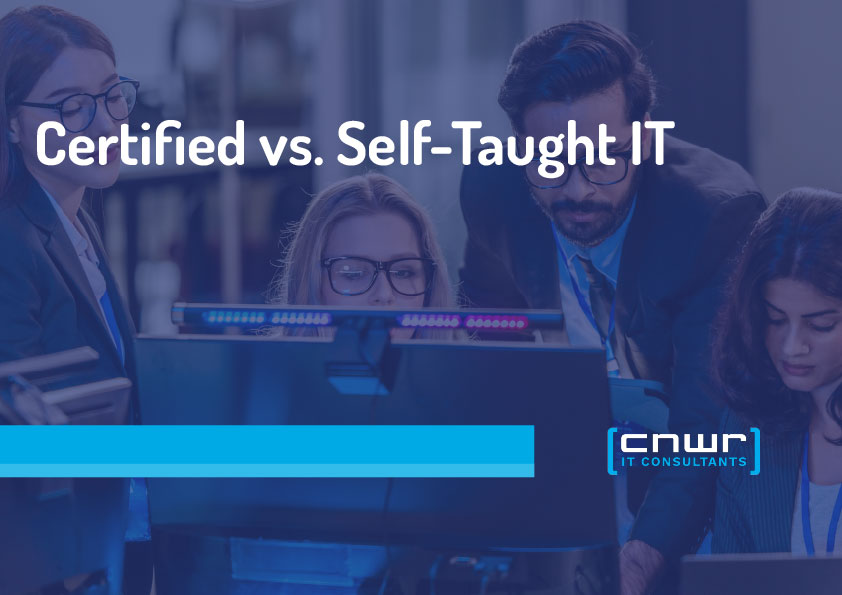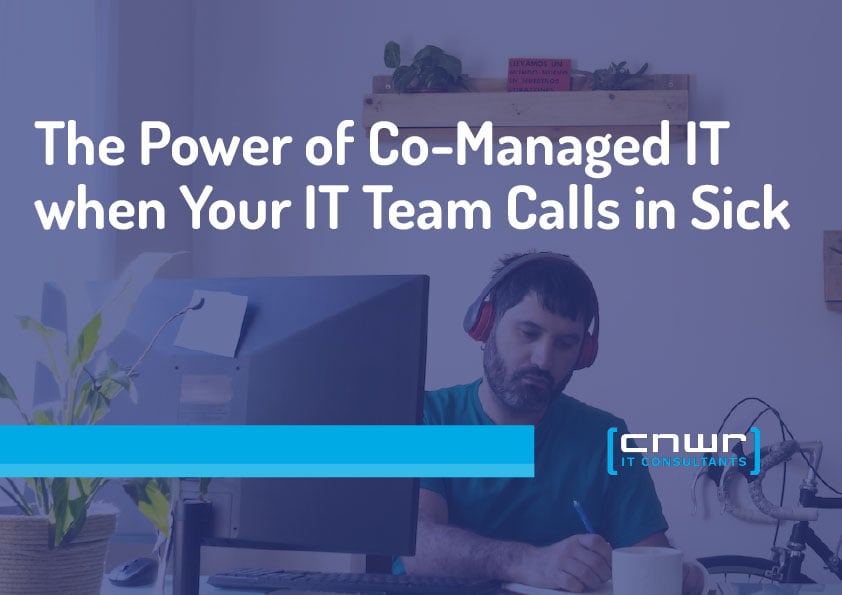Is your business's IT in the hands of a certified professional or a self-taught guru? This isn't just a simple hiring question; it's a fundamental query about your company's exposure to risk.
While the tech world has its share of brilliant, self-made experts, the structured knowledge and validated skills of certified professionals provide a level of security and assurance that is difficult to replicate. For small to medium-sized businesses, understanding the difference isn't just academic…it's a critical component of a robust growth and security strategy.
The debate between formal certification and hands-on, self-acquired knowledge is as old as the IT industry itself. Both paths can produce highly competent individuals, but they cultivate different strengths and weaknesses. A self-taught professional might be incredibly resourceful and current on the latest niche trends, while a certified expert brings a comprehensive, standards-based understanding of systems and security protocols. The crucial part for any business is recognizing where the skills gaps lie and what that means for your operational stability and security.
This post will explore the distinct worlds of certified and self-taught IT support. We'll examine the benefits and potential pitfalls of each, clarifying how unrecognized skill gaps can quickly escalate into significant business risks. Ultimately, you will have a clearer picture of why a strategically managed IT framework, like the one we advocate for in our post, IT Support: Your Secret Weapon for Business Growth, is non-negotiable for any company serious about its future.
Table of Contents
- What is Certified IT Support?
- What is Self-Taught IT?
- The Benefits and Pitfalls of Each Approach
- Where Skills Gaps Become Business Risks
- Secure Your Future with a Trusted Tech Partner
- Key Takeaways
- Frequently Asked Questions
What is Certified IT Support?
Certified IT support refers to professionals who have earned credentials from recognized industry bodies like CompTIA, Cisco, Microsoft, or AWS. These certifications are more than just pieces of paper; they are proof that an individual has met rigorous, standardized criteria for knowledge and competence in a specific area. Think of it as a quality guarantee.
Certification programs provide a structured, comprehensive curriculum that ensures all essential topics are covered. For instance, someone pursuing a CompTIA Security+ certification will study everything from threat management to cryptography, leaving no stone unturned. Vendor-specific certifications, like the AWS Certified Solutions Architect or Microsoft Certified: Azure AI Engineer Associate, guarantee expertise with the exact tools and platforms that businesses rely on daily.
The process is demanding. It involves dedicated study, hands-on labs, and passing expensive exams that must be renewed every few years. This commitment demonstrates a professional's dedication to their craft and to maintaining current knowledge in a field that changes at lightning speed.
What is Self-Taught IT?
A self-taught IT professional forges their own path. They learn through a combination of online resources, personal projects, and on-the-job problem-solving. These are often the resourceful, endlessly curious individuals who build their own home labs, contribute to open-source projects, and live on the cutting edge of new technology.
Their education is driven by passion and practical need, allowing them to learn on their own schedule and often with minimal financial investment. Using resources like YouTube, online courses from platforms like Coursera or Udemy, and official documentation, they can become highly skilled in specific domains. This hands-on, project-based learning often results in a practical, real-world understanding of technology that is incredibly valuable.
However, this path lacks a formal structure. Without a syllabus to guide them, self-taught professionals can unknowingly develop gaps in their foundational knowledge. They might be wizards at scripting but have a limited understanding of network security principles, or they could be brilliant at troubleshooting but miss the bigger picture of enterprise-level IT architecture.
The Benefits and Pitfalls of Each Approach
So, which is better? The truth is, it depends on the context. Both certified and self-taught professionals bring unique value to the table, but they also come with inherent risks.
The Certified Professional
Benefits:- Validated Expertise: Their skills are verified against industry standards. You know what you're getting.
- Comprehensive Knowledge: Structured learning ensures they have a solid foundation across all critical areas.
- Industry Recognition: Employers worldwide recognize certifications as a reliable measure of proficiency.
- Potential for "Paper Tigers": Some may be good at passing exams but lack real-world problem-solving skills.
- Cost and Time: Certification is a significant investment, both for the individual and for employers who support training.
- Slower to Adapt?: A reliance on formal curriculum might mean they are slightly behind the absolute newest, niche technologies.
The Self-Taught Professional
Benefits:
- Resourcefulness and Adaptability: They are masters of learning on the fly and finding creative solutions.
- Passion-Driven: Their knowledge is often deep in the areas they are most passionate about.
- Cost-Effective Learning: They can acquire skills without the high cost of formal courses and exams.
- Knowledge Gaps: Without a formal curriculum, they can miss fundamental concepts, especially in security and networking.
- Lack of Formal Validation: It's harder for an employer to gauge their actual skill level without a recognized credential.
- Limited Mentorship: They often miss out on the valuable feedback and networking that come with formal training programs.
Where Skills Gaps Become Business Risks
The real issue for your business isn't whether your IT support is certified or self-taught; it's the unidentified skills gap. Statistics paint a stark picture: 57% of companies feel the cybersecurity skills gap puts them at moderate to extreme risk. When your IT support has blind spots, your business is exposed.
Imagine your IT person is a self-taught genius at cloud infrastructure but has never formally studied network security. They might build a fantastically efficient system that, unfortunately, has vulnerabilities a certified professional would have spotted immediately. This isn't a failure of intelligence; it's a failure of structured, comprehensive training. These gaps can lead to:
- Increased Security Vulnerabilities: With cyberattacks growing more sophisticated, a superficial understanding of security is no longer enough. Gaps in knowledge about threat analysis, data encryption, or secure network design can lead to devastating data breaches.
- Delayed Projects and Innovation: A lack of specific skills can bring critical projects to a halt. In fact, 35% of organizations have delayed security projects due to a lack of talent. This directly impacts your ability to compete and grow.
- Inefficient Systems: An IT professional without a full understanding of best practices might implement solutions that work in the short term but are inefficient, unscalable, or difficult to maintain, costing you more in the long run.
- Compliance Failures: For industries with strict data-handling regulations (like healthcare or finance), a gap in compliance knowledge can lead to hefty fines and legal trouble.
The global cybersecurity workforce gap sits at over 3.4 million professionals. Your business is competing for this limited talent. Relying on a single individual, certified or not, to cover all your bases is a risky strategy.
Secure Your Future with a Trusted Tech
Partner
So how do you bridge the gap and protect your business? You don't hire just one person; you partner with a team.
At CNWR, we provide access to a collective of certified experts with decades of combined experience across every domain of IT. We don't have skills gaps, because our team's diverse expertise covers everything from network architecture and cybersecurity to cloud management and data analytics. We've guided countless businesses through their technological evolution because we understand the "why" behind every decision.
You get the best of both worlds: the structured, validated knowledge of certified professionals and the practical, real-world experience that comes from managing complex IT environments for businesses just like yours. Stop gambling on the hope that one person knows everything. Let our team become your IT department and your secret weapon for growth.
Ready to eliminate your IT skills gap for good? Contact CNWR today and let's build a secure and successful future for your business.
Key Takeaways
- Certified IT provides structured, validated expertise that is recognized industry-wide.
- Self-Taught IT often results in resourceful, passion-driven experts, but can lead to significant knowledge gaps.
- Skills Gaps are Business Risks: Unidentified gaps in knowledge, especially in cybersecurity, expose your company to data breaches, project delays, and financial loss.
- Team-Based Support is the Solution: Partnering with a Managed Services Provider (MSP) like CNWR gives you access to a full team of certified experts, eliminating the risks associated with relying on a single individual.
Frequently Asked Questions
- Is it better to hire a certified IT professional or an experienced self-taught one?
The ideal candidate often has both certifications to validate foundational knowledge and hands-on experience to prove practical application. However, for a business, the safer and more comprehensive solution is to partner with an MSP that provides a team of certified and experienced professionals, eliminating any single point of failure or knowledge gap. - How can my business identify our current IT skills gaps?
A thorough IT risk assessment is the best starting point. This audit, often conducted by a third-party consultant or MSP, evaluates your entire technology stack, from infrastructure and security protocols to data backup and disaster recovery plans. It will pinpoint vulnerabilities and areas where your current support may lack the necessary expertise. - Can't I just pay for my existing IT staff to get certified?
Investing in your team's training is always a great idea and can help close some gaps. However, one person can't be an expert in everything. The IT landscape is too vast and complex. Supporting your staff's growth should be part of your strategy, but it doesn't replace the comprehensive security and breadth of knowledge provided by a dedicated team of specialists.




